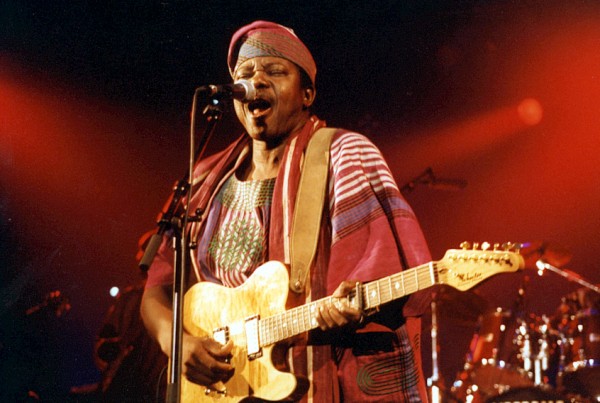BY ‘TUNJI AJAYI
Musical entertainment is a very important part of socio-cultural lives of the Africans. Almost every aspect of their lives is affected by music. They often employ music as they work to its rhythmic beats and its soulful tunes especially to expedite physical actions at their often energy-sapping work at farms, market places, workshops etc. Indeed to mitigate the effect of work burden on their psyches and diffuse work tension, they often shrill, oozing out musical sounds through their lips and teeth.
Africans enjoy music everywhere even in the church. No church ever garners large congregation of adherents every Sunday without endless rendition of spiritual songs, ably accompanied by musical instruments beaming out soulful tunes at high crescendo. Traditional worshippers not only use their esoteric incantatory songs to appease their gods. They also employ songs to entertain themselves and their converts. Warring people in Africa have in the past employed war songs to engender the spirit of cooperation and unity to fight common enemies. All this buttresses the importance of music in social, cultural and spiritual lives of Africans.
Nigeria, the largest black nation in the world and the largest country in the African continent has distinct music culture. For example, every weekend is seen as a period of respite from work pressure of previous days of the week. This period is usually agog with celebration of birthday parties, baby-naming ceremonies, wedding, burial ceremonies, house warming events etc. Music rendition often plays dominant role in these usually convivial events. Local musicians – each playing his own genre of music – are hired to play live at such colorful ceremonies, where celebrants and well-wishers often dance and drink to stupor, while variety of local foods and drinks are often at the beck and call of attendees.
Advertisement
While stressing the importance of music in socio-cultural lives of the people, the World Book Encyclopedia states unequivocally that “it forms an important part of many cultural and social activities. People use music to express feelings and ideas. Music also serves to entertain and relax. Like drama and dance, it is a performing art.” Music is also a good means of effective communication. Messages passed across to the receiver through musical patterns are often more potent than mere verbal or written words, since messages embedded in such music are easily remembered and thus easily evoke actions.
Good music has also been found to have good therapeutic effect. The veracity of this claim has been confirmed far back in the bible time, when the ailing King Saul whose depression defied every orthodox therapy, until he listened to good music from the young harpist and songster David before he got cured of devastating depression. Yes, fine music has therapeutic value. Thus, William Congreve, an English playwright and poet, could not have exaggerated in his Hymn to Harmony, when he said that “music alone with sudden charms can bind the wandering sense, and calm the troubled mind.”
No doubt one of the greatest musicians that have come out of African continent is the legendary King Sunny Ade who has rendered soulful music to the entertainment world ceaselessly in the past 52 years. The legendary artiste is perhaps one of the very few artistes on the planet earth who has played music worldwide for so long a period of time and is still found useful in the entertainment world till now. The energetic musician is still playing scintillating music and honoring almost all live engagements till today in every corner of the world. A careful study of King Sunny Ade’s juju genre of music reveals that it has real African elements which have sustained his musical pattern till now.
Advertisement
Ade’s, as fondly called in the US and European entertainment market has the knack to embellish his music with core undiluted Yoruba lexicon. It is the tradition of the Yorubas, the largest ethnic tribe in the south western part of Nigeria, to sing in praise of themselves especially to show appreciation for good deeds and encourage others to embrace philanthropic deeds. This is also true of most of many of the 250 different ethnic groups in Nigeria including the Ibos, Hausas, Edos, the Itsekiris etc. Hence it is common practice of most musicians to sing in their respective dialects in praise of their patrons. King Sunny Ade goes beyond rendering praise songs, he often lavishly applies descriptive names, cognomen – oríkì ìdílé, to embellish his adulatory songs to extol the sterling virtues of his fans. Oríkì ìdílé involves deep research works on the part of a skilled musician to know the historical antecedents of a person in whose praise he sings. Hardly is there any of Sunny Ade’s music album that does not include copious application of oríkì ìdílé.
For example in ASLP 24 – Òsùpá mi t’ólé which the music star released in 1981, KSA singing in praise of his subject enthused: Omo Oba má je’yà ó gbé; Omo aje baále má bà’lú je; Ajànàkú tíí mi igbó kìji-kìji; Omo asakasìkì adúró d’ogun. He thus informs the audience that the fore-parents of his patron are of royal origin (i.e. omo oba) who detests cheating and avenges for the oppressed, (má je’yà ó gbé) and whose reign brought development to the community (Omo aje baále má bà’lú je). Using the core Yoruba lexicon, he lets the audience into the background of the subject as a great, fearless warrior in his expression: Omo asakasìkì adúró d’ogun, which evidently depicts the bravery of his fan, since his ancestors never turn lily-livered in the face of war, but actually in expectation and often fully prepared for it. Again, Sunny often latches on metaphor to depict the awesome power or influence of the subject of his praise songs, e.g. (Àjànàkú tíí mi igbó kìji-kìji). Àjànàkú here means the Elephant, who we know is very awesome and whose intimidating bearing makes other animals in the wood tremble. Hence, he eloquently demonstrates that he does not render his songs in trite or banal manner.
Most often he applies proverbs, aphorism, witticisms, etc. to emphasize his points; thus making his music legitimately pleasing and enlightening. Proverbs are words of wisdom often applied by the elderly people in Nigeria, most especially by the Yorubas and the Ibos to stress their points and assert their veracity. For example, Sunny sings in the album: “Nigeria’s Sounds of the Moment” (1974); employing strong proverbs to reinforce his message, he says that honor and fame were showered on him by the benevolent God through his aphoristic message: “A kìí ru’gbá ariwo l’órí, k’á tó l’órúko; A kìí w’èwù òkìkí, kí á tó di eni ìlúmò. Olúwa oba níí dá ni m’áriwo.” This literally means that someone does not have to grovel or kowtow to become renowned, neither does he have to sew and wear a toga of popularity before one becomes famous, since it is God that grants honor and fame at His own time. A moral lesson for those who are impatient to await God’s time but are rather in hurry to achieve success. À
King Sunny Ade’s music has deep philosophical messages for the wise to ponder upon. His ever-didactic lyrics always have some lessons or morals to teach every perceptive audience. This explains why the elderly people, the traditional rulers, and those who value native sense and moral scruples adore him like a saint. While the lyrics often attract the elderly audience, his charming music with dynamic instrumental passage has titillated the youths who enjoy and latches on many elements found in his music. Sunny has the gusto to gravitate from pop to soul or to jazzy instrumentals from one breath to another even in a single musical rendition viz: “3-6-5 is My Number” track In Private Line, “My Pretty Suzzy”, “Igbeyin Lo Ju Esan A Ke”; “Mo fe Da bi Olurun Mi” in Sound Vibration album “Happy Celebration to King of Music” etc. all have either pop, jazz, or lullaby instrumentals.
Advertisement
KSA enriches his beats with heavy and multiple percussion instruments whose sound flow at brisk tempo without running into discordance. The Yorubas enjoy dancing to the lead talking drum, the (iya’lu) which often reels out esoteric and abstruse messages which can only be understood by the initiated.. KSA easily understands abstruse messages of his talking drummers, most especially the iya’lu. Thus, he readily and spontaneously responds to such messages with precision, which subsequently explains his bizarre dancing style.
The ebullient artiste remains the cynosure of entertainment public eyes for this long because of his avid love for intense research works, not only on African traditional music, but also on Yoruba anthology and lexical structure. He is renowned worldwide for his stagecraft and enchanting showmanship. A master in kinetics, even at 73 he has more reasons to sing his “Kó dùn. Kó pò. Kó pé. Olúwa ló n fún ni.” That is. to be sweet, and yet be sufficiently plenty, and to last long, is God’s blessings.” His sizzling performances hinge mainly on his passion and love for excellence on whatever he does. Sunny, a complete and unapologetic teetotaler has intense hatred for alcoholism and drunkenness. This epitome of humor with chameleonic image, sextuples as an artiste; and artist – most fans may not know that KSA sketches and designs the templates of his albums by himself.
Rated one of the 100 greatest Guitarists in the world, The Master Guitarist dominates the Guitar world completely, even to the awe and amazement of its manufacturers; making the ubiquitous string instrument to do his bidding to provide any desire tune of his choice; from the mumbling sound of the tidal waves to the endless prattling of a loquacious parrot. And from the hee-hawing of a donkey to the endless barking of a rabid dog. Sunny is adept at creating with his lead Guitar the stridulating voice of a cricket or the snarling tone of an enraged tiger. Should you be in doubt of this assertion, check the archives and re-listen to his masterpiece album AS1-L: Vol. 7 – “A F’àì Bá won Jà” (1973), or the epic and epoch-making release AS 15-L “Sunny Ti De” (1973), or AS26-L: “Synchro System.” Or his recondite, cognomen-laden LPAS 8020 Vol. 6 – “Ògún II” (1972) KSA, the effervescent King of World Beats evidently rules the world of music!
A consummate percussionist, King Sunny Ade is also an actor in many films, a consummate dancer, a poet and philosopher, who has successfully dazzled the entertainment world for over 5 decades. One of the most querulous personalities ever known by this writer, Sunny is hardly satisfied with any of his own albums. He has the knack for recording and re-recording, canceling and re-packaging over and over again, all in a bid to get the best output. And yet the best is never his best to him! Sunny can spend almost the entire 365 days of the year hibernating in solitude, ruminating on new ideas as concerns his genre of music; or spending and spending heavily to acquire latest equipment, which he masters and applies almost with computerized precision.
Advertisement
Being with KSA for a moment can be an enchanting and exhilarating experience! His uncommon affability, geniality and charms once made a five hour hang-out with him in one posh corner of Lagos, Nigeria seemed like only a 5 minutes rendezvous with this writer. His personality and warmth dissipate boredom and repel lassitude. Where does he get these strange skills and ideas that keep him on the world entertainment stage for over five decades from? Sunny looked askance, ruminating and perhaps struggling to know from where. In the end, a deep sigh. And then he quipped: “All wisdom comes from God.” And why is virtually all his over 240 albums are so deep with witticism and laden with proverbs and philosophy? A long pause again and a laconic retort: “Wisdom is learnt from the feet of the elders.”
Perhaps there are useful lessons to learn from this mercurial and enigmatic personality as he clocks 73 this September 22, 2019. King Sunny Ade is known all over the world with millions of fans enjoying his music with its ever-didactic messages. This writer, who keeps an archive of all his evergreen albums, has discovered his music to have grown over decades to be enriched with “predictive, descriptive and prescriptive” values1. The music ricochets and blares loudly beyond Nigeria’s shore. Sunny honor shimmers across the globe. Yet, he sings in Yoruba, his mother tongue and native language. His music does not only entertain, it is meaningful and thus evokes actions. A lesson? Our young and upcoming artistes should be proud of their origin, and should not despise the humble beginning. Nobody elevates the one who deflates himself. A river that forgets its source often dries up. Our upcoming artistes should learn to engage in research works aimed at playing good and meaningful music.
Advertisement
KSA personifies excellence and dynamism in musical arts. A lesson? Be the best of whatever you are, and shimmering honor shall be in your pursuit. The indomitable KSA, an adjunct Lecturer in music at the prestigious Obafemi Awolowo University, Ile-Ife, Nigeria and several award honorees began his musical career in 1967 and still is found relevant in the entertainment world till today, honoring both local and international engagements, and giving exquisite stage performances.
A lesson? Our modern-day youths should be consistent and learn to “grow up” with patience and forbearance, rather than “jumping up” in haste. A man that grows up gradually often remains on top with unblemished honors. But the impatient one that jumps up hastily, using short-cut methods; pursuing vainglorious activities and inordinate ambitions comes down spontaneously in utter shame. And that is the corollary. Verbum Satis Sapieti
Advertisement
King Sunny Ade The Legend: Cultural Communication via a Genre of African Music by this writer. (Amplified and re-edited version in full elegant color with pictures being packaged will be published soon.
Ajayi, writer, author and communication scholar writes from Lagos, Nigeria.
Advertisement
Views expressed by contributors are strictly personal and not of TheCable.
Add a comment






